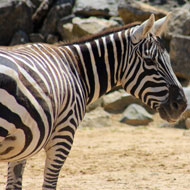Zebra stripes may dazzle flies and prevent disease - study

"Stripes may dazzle flies in some way once they are close enough to see them with their low-resolution eyes."
Research by the University of Bristol and UC Davis, California, USA, has provided new evidence that zebras evolved striped coats to avoid biting flies.
Their study investigated the behaviours of tabanid horse flies around captive zebras and domestic horses in North Somerset. Researchers found that flies approached the zebras and horses at similar speeds, but on approach to the zebras, the flies failed to slow down, which is is essential for a successful landing.
"This reduced ability to land on the zebra’s coat may be due to stripes disrupting the visual system of the horse flies during their final moments of approach,” said Dr Martin How from the University of Bristol. "Stripes may dazzle flies in some way once they are close enough to see them with their low-resolution eyes."
The study ‘Benefits of zebra stripes: Behaviour of tabanid flies around zebras and horses’ by Tim Caro, Martin How et al is published in PLOS ONE.



 The latest
The latest